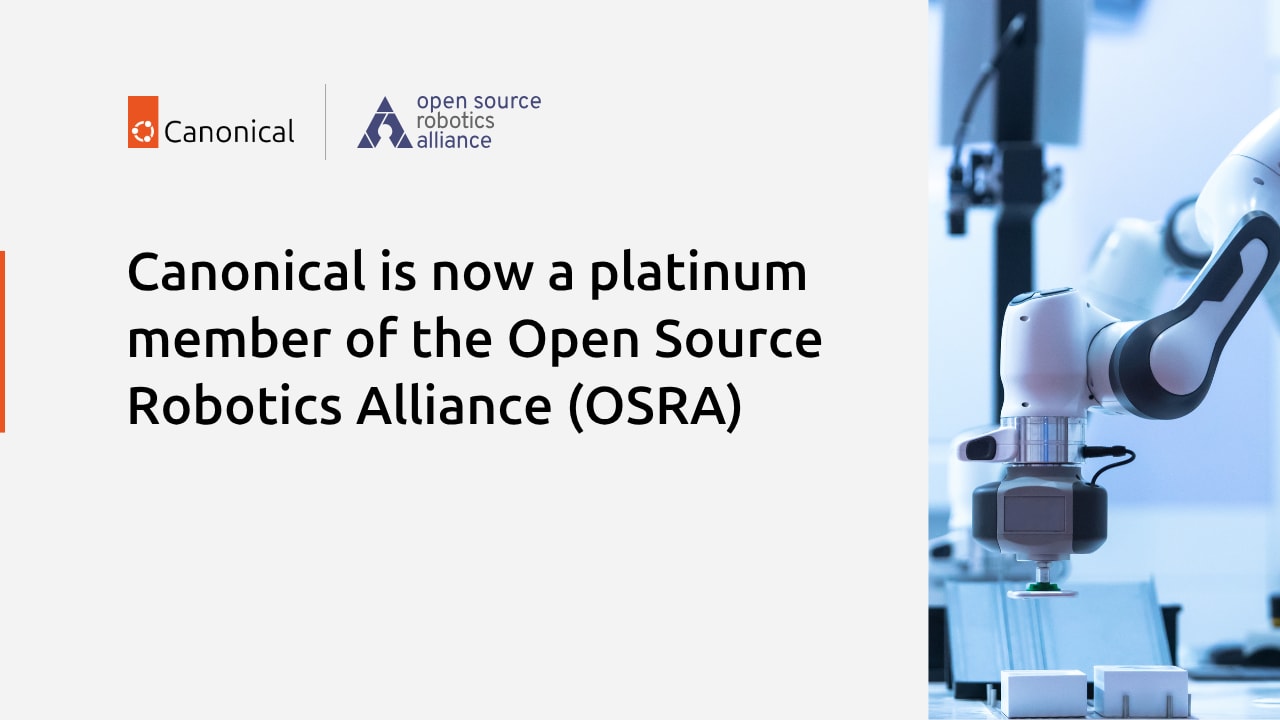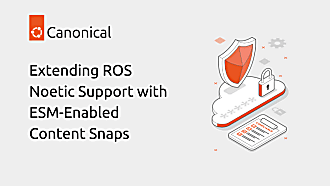Gabriel Aguiar Noury
on 20 August 2025
Ubuntu is the home of ROS. The very first ROS distribution, Box Turtle, launched on Ubuntu 8.04 LTS, Hardy Heron, and since then, Ubuntu and ROS have grown hand in hand. With every Ubuntu LTS release, a new ROS distribution follows, an intentional alignment that ensures ROS works out of the box on Ubuntu Desktop, Server, and Core, from development to deployment.
Canonical remains committed to the future of ROS. Ubuntu 24.04 LTS and 22.04 LTS are Tier-1 platforms for ROS 2 (including Jazzy and the forthcoming Kilted release), and with each new ROS 2 cycle, we will continue to prepare, validate, and maintain timely packages on Ubuntu. Through initiatives like Expanded Security Maintenance for ROS (ESM for ROS), Canonical has helped lead the way in securing ROS for enterprise use, delivering long-term security updates for ROS releases. Alongside Ubuntu Desktop, Ubuntu Core – a minimal, secure, and strictly confined OS – has supported companies deploying ROS at scale, helping them meet industrial standards in factories and beyond.

Now, we’re proud to announce that Canonical has elevated its membership in the Open Source Robotics Alliance (OSRA) to Platinum status.
“Robotics is evolving rapidly, and we are entering a new phase that will define the next era of automation. Open source has been the foundation of this growth, and ROS will remain central to scaling and deploying advanced robotics worldwide,” said Olivier Philippe, VP of Engineering at Canonical. “Collaboration is what keeps open source strong. Our deeper engagement with OSRA reflects our continued commitment to securing the future of ROS and empowering robotics companies building on Ubuntu.”
Supporting open, community-led governance for ROS
In March 2024, the Open Source Robotics Alliance (OSRA) was launched to ensure the long-term stability, security, and accessibility of open source robotics projects like ROS, Gazebo, and Open-RMF. The OSRA provides a formal governance structure where industry and community leaders share responsibility for maintaining and evolving the software that powers modern robotics.
Beyond governance, the OSRA creates a space for joint investment in critical initiatives – from improving security postures to advancing tooling and making ROS easier to adopt and deploy at scale. It’s about building not just open software, but an open, resilient ecosystem that companies, researchers, and developers can trust for the long term.
“Canonical, through its Ubuntu platform, its contributions to ROS, and its work on improving the security of open-source software, is one of the longest continuous contributors to open-source robotics,” said Geoffrey Biggs, CTO of Open Robotics. “The choice by Canonical to elevate its membership in the OSRA to the highest level demonstrates that they are serious about supporting open-source robotics in the long term, and are a partner that the OSRF can rely on into the future.”
By working closely with OSRA members, Canonical will continue to contribute its unique strengths:
- Out-of-the-box compatibility and stability, and an improved developer experience for ROS on Ubuntu
- Security and long-term maintenance for production deployments with ESM for ROS
- An industrial-compliant pathway to production through Ubuntu Core
Together, these efforts help make ROS a widely accessible, production-ready platform for innovators worldwide.
A shared commitment to the future of ROS
More than 15 years have passed, but Canonical’s commitment remains the same: helping the robotics community deliver ROS in a format that’s easy to adopt, secure by design, long-term supported, and ready for production on the world’s most reliable open-source OS.
Canonical’s increased commitment reflects our belief in open, community-led governance and our dedication to strengthening the future of ROS and open source robotics. Together with fellow OSRA members, we are committed to shaping the future of open source robotics through transparent governance, shared responsibility, and long-term security. Collaboration remains the key as we enter a new era where open source robotics will exceed real-world demands and, as always, continue to inspire us, as it always has.
To learn more about Canonical and our engagement in robotics:
- Discover our robotics portfolio
- Power your Ubuntu devices with Ubuntu Pro
- Understand the implications of the CRA for your company



